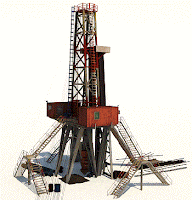 |
| land drilling rig |
Button's ignorance crops up almost immediately; in his first sentence, in fact:
"An oil rig is a mechanized platform that helps oil companies extract the fossil fuel from its source, usually underground or the bottom of the ocean."
Sadly, Andrew's information doesn't get much better as you read down the page, including such bogosity as,
- "Oil rigs take months, even years (in the case of offshore rigs), to build" – Sorry, Andy, the vast majority of rigs are erected in a matter of days. But, then, most of them are on land...
- "Oil rigs can't be set up anywhere. They have to be set up in oil fields where the physical geography permits extraction." – Bushwa: as long as you can lease the property and get a permit, you can set up a rig anywhere. It sure as heck doesn't have to be in an oil field!
- "A project on the geographic aspects of oil-rig construction could talk about different types of drills needed to penetrate different surfaces..." – First, you putz, drills don't "penetrate different surfaces," they penetrate different sorts of rock. Oh, and there are actually only a couple of different kinds of drills – rotary and cable – and a couple of different driving methods.
- "One project on different platform types uses diagrams to illustrate how engineers make different types of oil rigs for different purposes. " – The different platform types are designed for different water depths and expected wave and current conditions, not "different purposes."
¹ Come to think of it, a substantial number seem unaware that gasoline comes from oil! 😒
copyright © 2019-2023 scmrak
SI - OIL
No comments:
Post a Comment